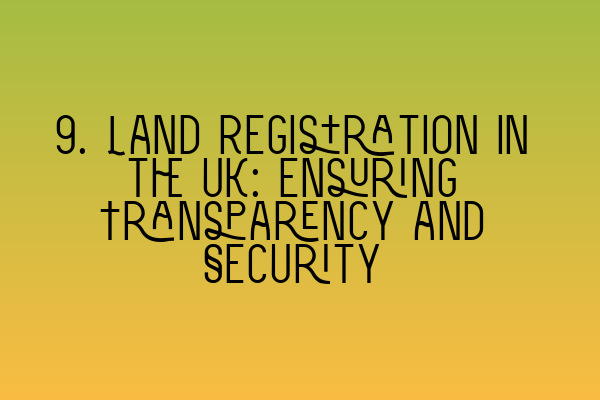Land Registration in the UK: Ensuring Transparency and Security
Welcome to the blog of SQE Property Law & Land Law, where we aim to provide you with valuable insights into various aspects of property law in the UK. In this article, we will discuss the importance of land registration in ensuring transparency and security when it comes to property ownership.
What is Land Registration?
Land registration is the process of recording details of a property, such as its boundaries, ownership, and any interests or rights that may affect it, in an official register. In the UK, land registration is overseen by the HM Land Registry, which maintains the Land Register.
The Land Register is a public record that provides a transparent and reliable source of information about land and property interests. It helps to protect and guarantee property rights, preventing fraud and disputes while promoting confidence in the property market.
The Benefits of Land Registration
Land registration offers several benefits to property owners, buyers, and lenders, including:
- Legal Protection: Once a property is registered, the owner receives legal protection for their ownership rights. This means that their claim to the property is protected and can be easily proven.
- Market Confidence: Land registration provides certainty and transparency in property transactions, giving buyers and lenders confidence about the ownership and status of a property.
- Prevention of Fraud: Land registration helps to prevent fraud by ensuring that only the registered owner or authorized persons can deal with the property. It also helps to detect any fraudulent activity, such as multiple registrations for the same property.
- Dispute Resolution: The Land Register provides an accurate and up-to-date record of property details, making it easier to resolve any disputes related to boundaries, ownership, or other property interests.
- Easier Conveyancing: The registration process simplifies the transfer of property ownership by making it easier for solicitors to verify ownership and conduct searches.
- Encouragement of Investment: Land registration encourages investment in properties by providing a secure and transparent environment for buyers and investors.
Overall, land registration plays a crucial role in the UK property market by ensuring transparency, security, and confidence for all parties involved.
The Land Registration Process
In the UK, the land registration process involves several steps, including:
- Application: The property owner or their solicitor submits an application to the HM Land Registry to register their property.
- Verification: The Land Registry verifies the application and conducts various checks, such as checking the property boundaries and confirming the ownership.
- Registration: If the application is successful, the property is registered, and the Land Registry updates the Land Register with the relevant details.
It’s important to note that land registration is not compulsory for all properties in the UK. However, it is highly recommended to register your property to enjoy the benefits mentioned earlier.
Conclusion
Land registration plays a vital role in ensuring transparency and security in the UK property market. By maintaining a comprehensive and reliable record of property details, the Land Register provides protection to property owners, buyers, and lenders. It prevents fraud, resolves disputes, and promotes market confidence. Therefore, it is strongly advised to register your property to reap the benefits of land registration.
Thank you for reading this article from SQE Property Law & Land Law. If you found this information valuable, make sure to check out our related articles:
- SQE 1 Practice Exam Questions
- SQE 1 Practice Mocks FLK1 FLK2
- SQE 2 Preparation Courses
- SQE 1 Preparation Courses
- SRA SQE Exam Dates
Feel free to explore our website for more informative articles on property law and land law topics. If you have any questions or require legal assistance, do not hesitate to contact SQE Property Law & Land Law. We are here to help!
